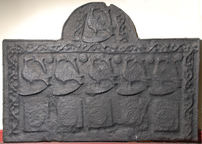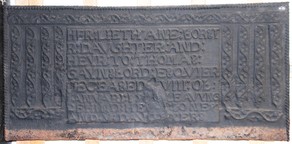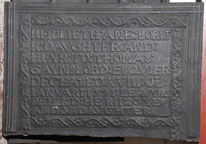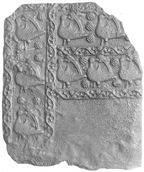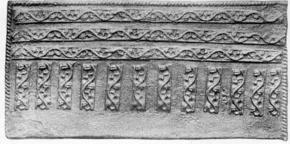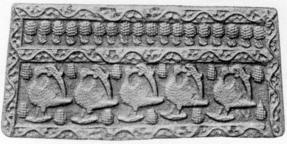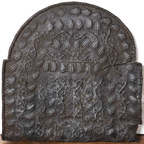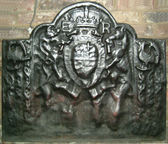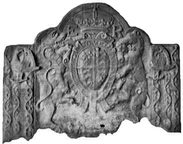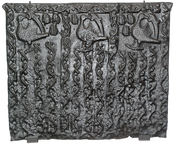-
383
Description: Arched rectangular shape; thin twisted rope edging on top and sides; trailing vine strips frame a row of repeated bird (probably swan) stamps (5) above repeated rose en soleil stamps (5); single bird stamp with two short, slanting vine strips in top arch.
Notes: The rose-en-soleil was the badge of King Edward IV and, thus, a Yorkist symbol, while the swan had been adopted by Henry IV and was, therefore, a Lancastrian symbol.
- Decoration tags:
- rectangular with round arch (shape)
- rope (edging)
- simple stamps
- carved stamps
- heraldic
- objects
Manufactured: in the mid- to late-16th century possibly at Pounsley Furnace, Framfield in the Weald area of England.
Current location: Anne of Cleves House, Southover High Street, Lewes, East Sussex, England.
Museum number: LH000.941 (part of the Sussex Archaeological Society museum group)
Citation: Butterfield, W. R., 1916, 'Old Wealden Firebacks', The Connoisseur, 46, pp. 197-209.
-
431
Description: Rectangular; twisted rope edging (top and sides); undulating vine strip repeated in a line four times along the top, and four times vertically on each side of central inscription panel, with shorter vine strip repeated below vertical strips on each side.
Notes: One of several firebacks that re-use the memorial inscription to 'Ane Forster' (Anne Foster) of Crowhurst, Surrey. The vine strip stamp is seen on other firebacks. The excrescence obscuring part of the text was probably the result of clumsy pouring of the iron during casting which displaced some of the sand mould.
Inscription: HER:LIETH:ANE:FORST / R:DAVGHTER:AND: / HEYR:TO:THOMAS: / GAYNSFORD:ESQVIER / DECEASED:XVIII:OF: / IANVARI:1591:LEAVYNG / BEHIND:HER:II:SONES: / AND:V:DAVGHTERS
- Decoration tags:
- rectangular (shape)
- rope (edging)
- simple stamps
- carved stamps
- carved pattern panels
- planklines
- text
Manufactured: in the late-16th century possibly at Pounsley Furnace, Framfield in the Weald area of England.
Current location: Hall Place, Bexley, Kent, England.
Museum number: LH000.904 (part of the Sussex Archaeological Society museum group)
-
436
Description: Rectangular; carved moulding edging; centre, inscription panel; undulating vine strip stamp repeated thirteen times to form an inner border along each side of the inscription panel.
Notes: The only fireback of the Anne Forster series to have edging formed from wooden moulding probably from dismantled furniture or panelling. Given to the Sussex Archaeological Society in 1850 by Sir Henry Shiffner Bt., of Coombe Place, Hamsey, Sussex. A former occupant of his burnt-out estate cottage, where it had been found, was said to have been a Miss Forster.
Inscription: HER:LIETH:ANE:FORST / R:DAVGHTER:AND: / HEYR:TO:THOMAS: / GAYNSFORD:ESQVIER / DECEASED:XVIII:OF: / IANVARI:1591:LEAVYNG / BEHIND:HER:II:SONES: / AND:V:DAVGHTERS
- Decoration tags:
- rectangular (shape)
- complex individual (edging)
- simple stamps
- carved pattern panels
- planklines
- text
Manufactured: in the late-16th century possibly at Pounsley Furnace, Framfield in the Weald area of England.
Current location: Anne of Cleves House, Southover High Street, Lewes, East Sussex, England.
(part of the Sussex Archaeological Society museum group)
Citation: Dawson, C., 1903, 'Sussex Iron Work and Pottery', Sussex Archaeological Collections, 46, pp. 1-54.
-
854
Description: Sub-rectangular fragment; undulating vine tendril strip repeated twice vertically from left edge with a bird stamp (probably a swan, a Lancastrian badge) repeated three times between, interspersed with a grape cluster stamp repeated seven times; vine tendril stamp repeated twice horizontally at right angles to rightmost vertical strip, three bird stamps between strips and two above, interspersed with seven grape cluster stamps.
Notes: This fragment incorporates common elements from a large series of firebacks.
- Decoration tags:
- rectangular (shape)
- trailing vine (edging)
- carved stamps
- animals
- plants
Manufactured: in the mid- to late-16th century possibly at Pounsley Furnace, Framfield in the Weald area of England.
Current location: Anne of Cleves House, Southover High Street, Lewes, East Sussex, England.
Museum number: LH000.924 (part of the Sussex Archaeological Society museum group)
- Attached to series:
- Pounsley series
- Vine strip series
- Swan series
- Furniture stamp firebacks
-
468
Description: Rectangular; twisted rope edging (top and sides); stamp formed of a bordered strip with an undulating vine with grapes and leaves, repeated six times in three horizontal rows of two; below, a short piece of the same strip positioned vertically and repeated twelve times.
Notes: The vine strip features on many firebacks indicating a common source. Illustration from Lloyd, 1925.
- Decoration tags:
- rectangular (shape)
- rope (edging)
- simple stamps
- carved stamps
- objects
Manufactured: in the mid- to late-16th century possibly at Pounsley Furnace, Framfield in the Weald area of England.
Current location: not known.
Citation: Lloyd, N., 1925, 'Domestic Ironwork I', Architectural Review, 58, pp. 58-67.
- Attached to series:
- Pounsley series
- Vine strip series
- Furniture stamp firebacks
-
469
Description: Quasi-rectangular; edging formed of repeated bordered strip with undulating vine with fruit and leaves; horizontal line of two uneavenly repeated vine strips dividing the plate into two compartments, the upper comprising a grape bunch repeated eighteen times, the lower comprising a bird (probably a swan, a Lancastrian badge), its head turned to its left and one visible wing displayed and inverted, repeated five times with a grape bunch repeated twelve times at the ends and between each swan on the top and bottom of the compartment.
Notes: The vine strip, swan and grape bunch stamps feature on many firebacks indicating a common source. Illustration from Lloyd, 1925.
- Decoration tags:
- rectangular (shape)
- trailing vine (edging)
- simple stamps
- carved stamps
- heraldic
- animals
- plants
- objects
Manufactured: in the mid- to late-16th century possibly at Pounsley Furnace, Framfield in the Weald area of England.
Current location: not known.
Citation: Lloyd, N., 1925, 'Domestic Ironwork I', Architectural Review, 58, pp. 58-67.
- Attached to series:
- Pounsley series
- Vine strip series
- Swan series
- Furniture stamp firebacks
-
1251
Description: Arched rectangular shape; twisted rope edging (top and sides); 'concentric' arrangement of 29 'grape bunch' stamps inside the rope edging, a further six inside them horizontally at the top; within those, five lengths of an undulating vine strip angled approximately to fit the curved shape; within them, 24 'grape bunch' stamps, with a single vine strip inside them horizontally at the top and a further line of seven 'grape bunch' stamps horizontally below that; below them, another vine strip horizontally; below that four vine strips placed vertically interspersed with three columns of five 'grape bunch' stamps.
Notes: Both the vine strips and the 'grape bunch' stamps are seen on other firebacks in the same series; the complexity of this arrangement of stamps is paralleled on a fireback recorded at Grayswood, Surrey (no. 72). Mallams auction, Oxford, 22 Feb 2023 lot 94 (£200).
- Decoration tags:
- rectangular with round arch (shape)
- rope (edging)
- simple stamps
- carved stamps
- objects
Manufactured: in the late-16th century possibly at Pounsley Furnace, Framfield in the Weald area of England.
Current location: not known.
- Attached to series:
- Pounsley series
- Vine strip series
- Furniture stamp firebacks
-
620
Description: Arched rectangular shape with rounded corners; ovolo within fillet moulding all round; oval Tudor royal shield with garter surrounding, topped with a royal crown; dragon and greyhound supporters; initials split by crown; inscription on a fillet between legs of supporters, behind garter finial; motto on an Ionic plinth at bottom; two rectangular side panels, each with a bird stamp (probably a swan, a Lancastrian badge) above a vine strip stamp repeated three times vertically.
Notes: One of two known variants of the John Harvo fireback incorporating extension panels with vine strips and 'swans'; the positions of the swans vary slightly between the two variants.
Copies of this fireback are known.
Inscription: E R [+ Garter, Harvo and royal mottoes, all illegible]
Arms: Tudor royal - prob. Edward VI
- Decoration tags:
- rectangular with round arch (shape)
- rope (edging)
- simple stamps
- carved stamps
- whole carved pattern
- individual letters
- extension panels
- heraldic
- armorial
- royal
- text
- animals
- objects
Manufactured: in the mid- to late-16th century possibly at Pounsley Furnace, Framfield in the Weald area of England.
Current location: Mark Ripley Forge & Fireplaces, Northbridge Street, Robertsbridge, East Sussex, England.
-
848
Description: Arched rectangular shape with rounded corners; ovolo within fillet moulding all round; oval Tudor royal shield with garter surrounding, topped with a royal crown; dragon and greyhound supporters; initials split by crown; inscription on a fillet between legs of supporters, behind garter finial; motto on an Ionic plinth at bottom; two rectangular side panels, each with a bird stamp (probably a swan, a Lancastrian badge) above a vine strip stamp repeated three times vertically.
Notes: One of two known variants of the John Harvo fireback incorporating extension panels with vine strips and 'swans'; the positions of the swans vary slightly between the two variants. Formerly at the old post office, Ticehurst, Sussex.
Inscription: E R / HONY SOIT QUE MAL Y PAYNCE
Arms: Tudor royal - prob. Edward VI
- Decoration tags:
- rectangular with round arch (shape)
- carved pattern panels
- whole carved pattern
- extension panels
- armorial
- royal
- animals
- objects
Manufactured: in the mid- to late-16th century possibly at Pounsley Furnace, Framfield in the Weald area of England.
Current location: not known.
-
735
Description: Rectangular; three birds (probably swans, a Lancastrian badge) turned to the left, their heads facing right, and the front edge of their left wing extended and inverted; vine pattern strips, one horizontal along the top, and 14, of varied length, vertically across the rest of the fireback; seven ‘grape bunch’ shapes with criss-cross markings, arranged in three groups — 3-1-3 — adjacent to the birds.
Notes: The same vine strips are found on several firebacks, including some of the ‘Anne Forster’ series; the birds are also seen on a number of firebacks; the ‘grape bunch’ shapes may be the same as those on the ‘Anne Forster’ graveslab in Crowhurst church, Surrey. John Starkie Gardner and later writers attributed the birds to an association with the Fowle family; this is unlikely to be correct as the Fowles came to prominence in the iron industry towards the end of the sixteenth century and had their own distinctive decorative emblems. Formerly in the collection of Lady Dorothy Nevill.
- Decoration tags:
- rectangular (shape)
- complex, furniture-derived (edging)
- simple stamps
- carved stamps
- animals
- objects
Manufactured: in the mid- to late-16th century possibly at Pounsley Furnace, Framfield in the Weald area of England.
Current location: Victoria & Albert Museum, Cromwell Road, Kensington & Chelsea, Greater London, England.
Museum number: M.120-1914 (part of the Victoria & Albert Museum museum group)
Citation: Dawson, C., 1903, 'Sussex Iron Work and Pottery', Sussex Archaeological Collections, 46, pp. 1-54.
Citation: Gardner, J. S., 1898, 'Iron Casting in the Weald', Archaeologia, 56, 1, pp. 133-164.
Citation: Straker, E., 1931, Wealden Iron (London, Bell).
- Attached to series:
- Pounsley series
- Vine strip series
- Swan series
- Furniture stamp firebacks
